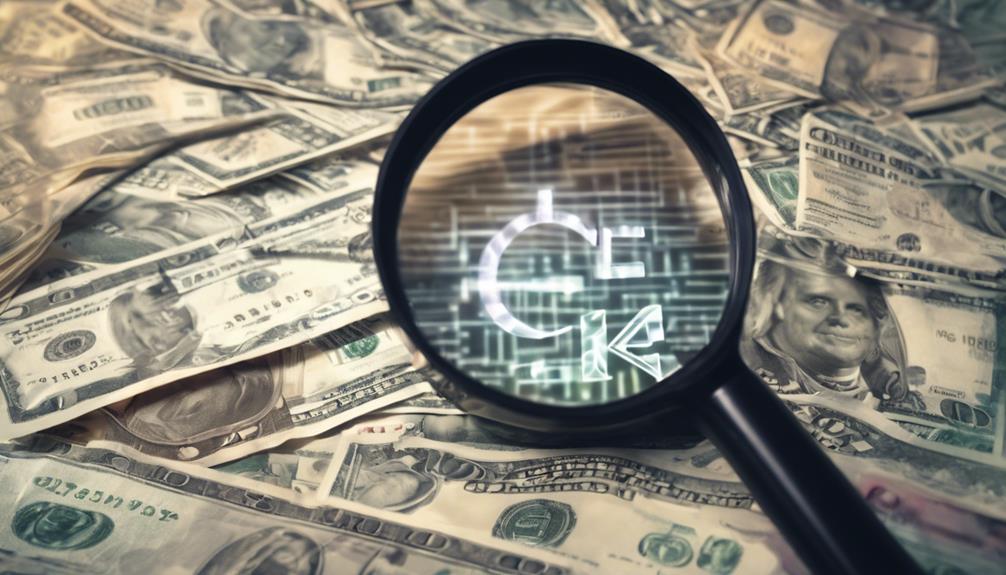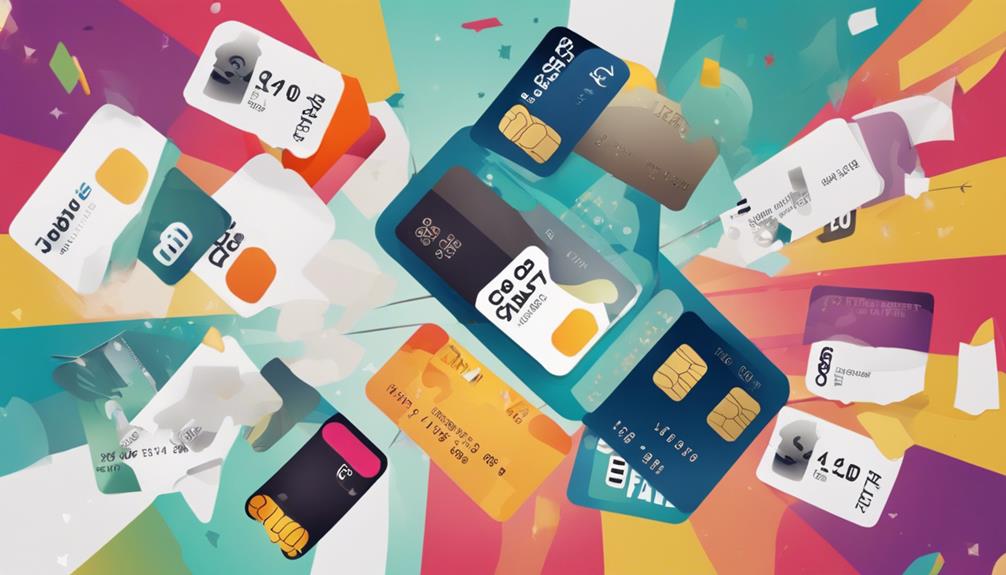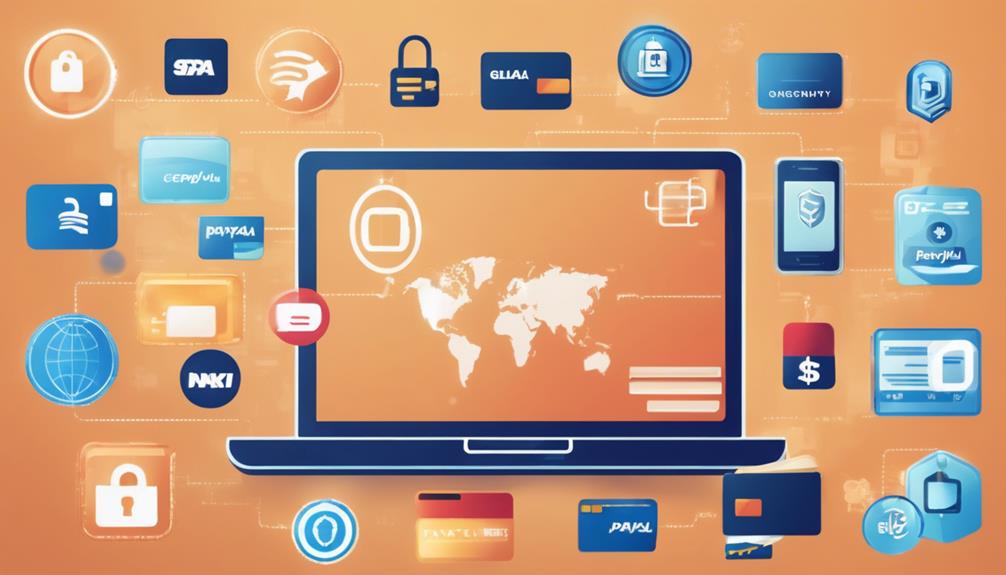Unravel the electronic check enigma with ease. E-checks mimic paper transactions but are digital, enhancing payment convenience. Businesses and individuals benefit from swift deposits and withdrawals. Fees vary but usually cost between $0.30 and $1.50 per transaction, making them a cost-effective choice. Compared to credit cards, e-checks offer lower fees, making them ideal for significant purchases and regular payments. They're commonly used for subscriptions and mortgages due to their efficiency. Explore the world of e-checks to optimize your financial processes.
Key Takeaways
- EChecks are electronic versions of paper checks for online payments.
- They streamline payment processes, offering modern, secure transactions.
- ECheck processing involves approval, setup, finalization, and verification steps.
- ECheck fees range from $0.30 to $1.50 per transaction with transparent gateways.
- EChecks are cost-effective, with lower fees than credit cards, ideal for various financial transactions.
Understanding Echecks

If you're looking to grasp the concept of eChecks swiftly, understanding their digital nature as a modern alternative to paper checks is crucial. This form of payment utilizes the internet to transfer funds directly from the payer’s bank account to the payee’s account. The entire process, from initiation to settlement, is conducted electronically, eliminating the need for physical checks to be printed, signed, and delivered. Electronic check processing has become increasingly popular due to its convenience, efficiency, and security features.
EChecks are fundamentally the electronic version of traditional paper checks, facilitating online payments and transactions through the Automated Clearing House (ACH) network.
This digital transformation enables funds to be electronically withdrawn from the payer's account and deposited into the recipient's bank account, streamlining the payment process for businesses and consumers alike.
Embracing eChecks means embracing efficiency in financial transactions, as they offer a modern, secure, and convenient way to handle payments in today's digital economy.
Echeck Processing

To efficiently process eChecks, understanding the key steps involved in authorization requests, payment setup, transaction finalization, and confirmation is essential. Here are four key points to keep in mind:
- Authorization Request: Initiating the payment process by requesting approval.
- Payment Setup: Setting up the necessary payment information and details.
- Transaction Finalization: Ensuring the transaction is completed accurately.
- Confirmation: Verifying that the eCheck payment has been successfully processed.
Echeck Fees

Learn about the varying eCheck fees charged by providers and businesses to understand the cost implications of this payment method. eCheck fees can range from $0.30 to $1.50 per transaction, making them generally more cost-effective compared to other payment methods.
In addition to the per-transaction fee, you might encounter additional charges such as application fees, monthly fees, return fees, verification fees, and more. Transparent gateways are aiming to reduce processing rates, providing you with a clearer picture of the costs involved.
Echeck Vs. Credit Cards

Comparing eChecks to credit cards reveals significant cost savings and lower processing fees for businesses and consumers alike. When deciding between the two payment methods, consider the following:
- Transaction Costs: eCheck transactions cost less than credit card transactions.
- Network Fees: ACH networks charge lower fees than card networks.
- Risk Factors: Lower risk in eChecks leads to reduced fees.
- Ideal Usage: eChecks are preferred for big-ticket items, recurring payments, and everyday purchases.
These points highlight the financial advantages of using eChecks over credit cards, making them a more cost-effective option for both businesses and individuals.
Echeck Usage

When using eChecks, consider their versatility for various transactions. EChecks are popular for subscription services, mortgage payments, legal retainers, and more. They're ideal for different payment scenarios due to their lower processing fees compared to other methods.
Businesses often choose eChecks for big-ticket items, recurring payments, and everyday purchases. Their efficient processing and lower costs make them a practical choice for various financial transactions.
Whether you're a consumer making a payment or a business receiving funds, eChecks offer a convenient and cost-effective solution. Embrace the flexibility and cost savings that eChecks bring to your financial transactions.
Electronic Payment Methods

Exploring the domain of electronic payment methods opens up a world of convenient and efficient financial transactions. Here are some key points worth noting:
- EFT (Electronic Fund Transfers): Facilitates fund transfers between bank accounts via online networks.
- ACH Payments (Automated Clearing House): Enables the process of funds between merchants and consumers' banks.
- eChecks: ACH debits that allow authorized payments from checking accounts.
- Credit Card Processing: Offers fast and secure transactions, but usually incurs higher fees.
Each of these methods has its advantages and is suited to different payment scenarios. Understanding their differences can help you choose the most suitable option for your financial transactions.
Echeck Security

To bolster the security of your eCheck transactions, make sure you implement robust measures like digital signatures and encryption. Digital signatures help verify the authenticity of the sender, while encryption guarantees that the information exchanged is protected from unauthorized access. Additionally, authentication mechanisms add an extra layer of security to your eCheck transactions. By incorporating these security measures, you can greatly reduce the risk of fraud and unauthorized access to your financial information.
| Security Measure | Description | Importance |
|---|---|---|
| Digital Signatures | Verify sender's authenticity | Ensures transaction security |
| Encryption | Protect information from unauthorized access | Safeguards sensitive data |
| Authentication | Adds extra layer of security to transactions | Enhances overall protection |
Frequently Asked Questions
Can Echecks Be Used for International Transactions?
Yes, eChecks can be used for international transactions in some cases. However, the availability varies depending on the eCheck provider and the countries involved. It's crucial to confirm with your provider that they support international eCheck transactions.
While eChecks offer a convenient payment method, always verify the specifics of international usability and any associated fees to make informed decisions when conducting cross-border transactions.
Are Echecks Reversible Like Credit Card Payments?
Yes, eChecks are reversible, but the process differs from credit card payments. Unlike credit cards, eChecks allow for a longer dispute period, typically up to 60 days.
You have the right to request a reversal if there are errors, fraud, or unauthorized transactions. However, it's important to act promptly and provide evidence to support your claim.
Reversing an eCheck involves contacting your bank or the processing provider to initiate the dispute resolution process.
What Are the Common Reasons for Echeck Rejections?
Common reasons for eCheck rejections include:
- Insufficient funds
- Errors in account information
- Fraudulent activities
- Inaccurate details provided during the transaction
These issues can lead to the rejection of the eCheck payment by the processing system. It's crucial to verify accurate and updated banking information and maintain sufficient funds to avoid rejection and potential fees associated with failed transactions.
Do Echeck Providers Offer Chargeback Protection?
Yes, eCheck providers typically offer chargeback protection to safeguard your transactions. This service helps mitigate risks by assisting in cases of disputed payments, fraudulent activities, or unauthorized charges.
How Do Echecks Impact Credit Scores and History?
eChecks typically don't impact credit scores or history directly since they aren't reported to credit bureaus.
However, if an eCheck payment bounces due to insufficient funds or other issues, resulting in a negative mark by the recipient, it could indirectly affect your creditworthiness.
To safeguard your credit, guarantee sufficient funds before sending eChecks to prevent potential negative consequences on your financial reputation.
Conclusion
To sum up, grasping eChecks is like discovering a treasure trove of efficient and cost-effective payment solutions. With their digital counterpart to paper checks, eChecks offer businesses and consumers a secure and streamlined way to process transactions.
By exploring the processing steps, fees comparison, and security measures, you can navigate the world of eChecks with confidence and clarity. Embrace this digital payment method to optimize your payment processes and enjoy the benefits it has to offer.










